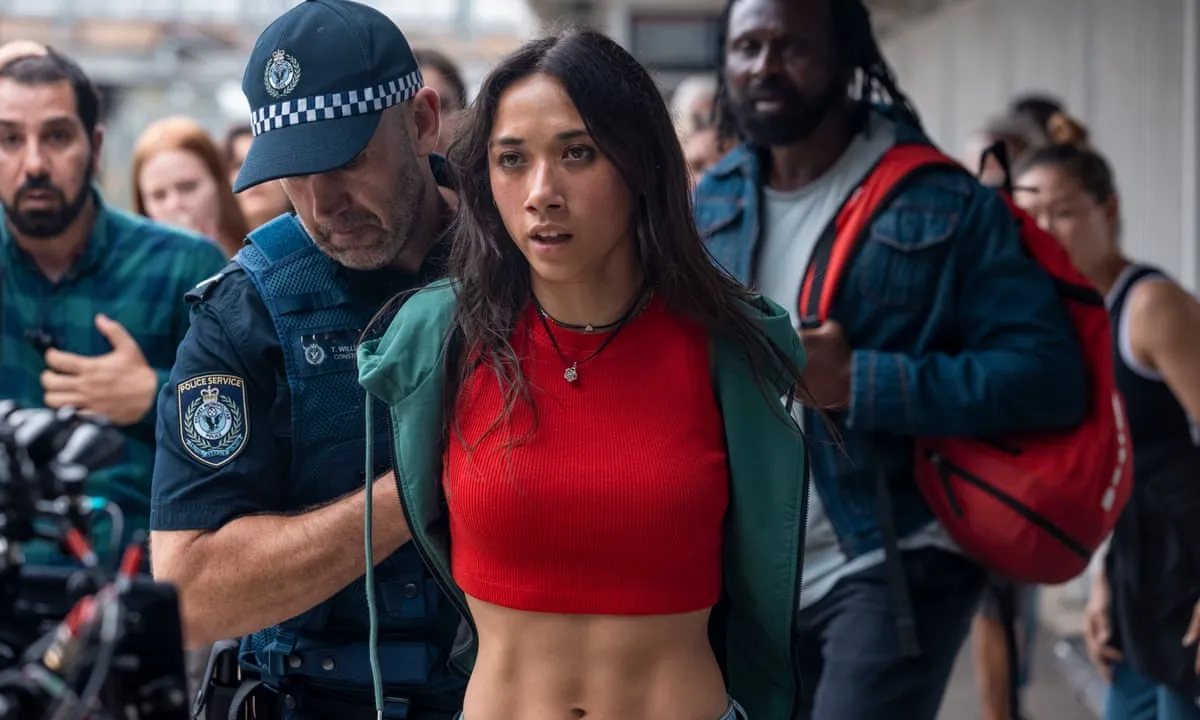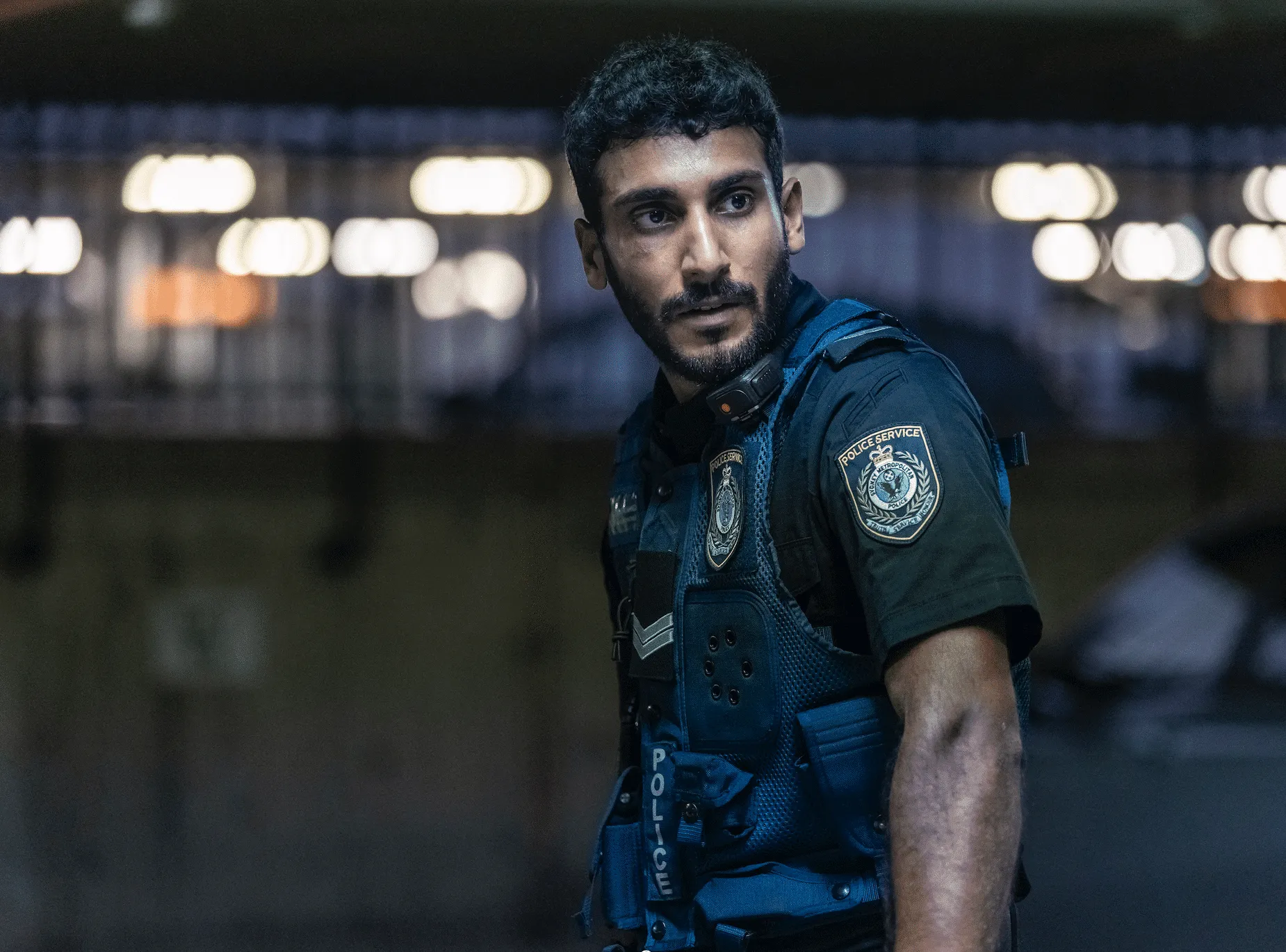Critical Incident is a psychological crime drama that grips from the start. Launching on Stan, the series centers around a “critical incident” involving police constable Zilficar “Zil” Ahmed, played compellingly by Akshaye Khanna, and troubled teen Dalia Tun, portrayed vividly by Zoe Boe. Their fates become intertwined one night in Western Sydney, setting off complex questions around police work in multicultural communities.
The show captures attention with these nuanced characters and the social themes woven into its intricate plot. Yet it also intrigues through clever uses of tension. Scenes tease out uncertainty, from the chilling opening at a police station to later juggles between timelines. Questions linger around precisely what transpired between Zil and Dalia to change their lives.
Character perspectives shift our understanding too. Zil feels driven to prove himself right, while Dalia seeks escape from a flawed system. Their gray motives mirror real life’s complexity better than clear-cut heroes and villains. Each episode injects another layer of ambiguity into an already murky situation with consequences for all involved.
From its twisting narrative to troubled portrayals, Critical Incident grips through unease rather than easy answers. Its tensions tease out thought-provoking implications, keeping viewers hooked until the unpredictable conclusion.
Critical Pursuits
The inaugural episode of Critical Incident grips the viewer from the start with a dramatic opening scene. We meet senior constable Zil Ahmed at the Blacktown police station, clearly distressed over something that occurred while on duty. Cutting back in time, we see Zil’s night unfolding—responding to calls across the bustling streets of Western Sydney.
That night he encounters Dalia Tun, a troubled teenager with a painful past. Zil spots Dalia from the description of a suspect wanted for assaulting an officer. When he approaches, Dalia flees, leading Zil on a fateful chase that ends at Blacktown train station during rush hour. In the pursuit, tragedy strikes—through a terrible accident, a bystander is killed. From here, a chain of events is set in devastating motion.
Over the six episodes that follow, Critical Incident explores the profound psychological and social impacts of this “critical incident” on its main characters and the community. As Zil spirals with doubt and loss of confidence in his role as a protector, Dalia finds herself drawn deeper into a life of crime through dangerous associations looking to exploit her vulnerabilities.
The series handles their intertwining storylines with care and depth. We see Zil, encouraged by peers, become obsessed with proving Dalia’s guilt in the quest for redemptions. Dalia desperately seeks escape from her circumstances through risky means. Their fates remain unpredictable to the very end, as the complex issues of racial profiling, the justice system, and trauma are probed with nuance.
Throughout it all, Critical Incident keeps viewers hooked with its compelling portrayal of ordinary people swept into extraordinary turmoil by the choices of a single night. Fans of gripping crime thrillers will find much to appreciate in this thoughtful drama and its exploration of when even routine precautions turn to profound human consequences.
A Complex Duo
The cast of Critical Incident delivers gripping portrayals, led by Zoe Boe and Akshaye Khanna in their complex roles as Dalia and Zil.
From the outset, Zo commands attention as the troubled Dalia. We see a girl carrying deep pain behind quiet eyes, longing to break free of a system failing her. When faced with injustice, Dalia responds with desperate choices. Zo makes us feel every emotion—fear, defiance, then heartbreak—without overacting. Her evolution feels both unpredictable and true to life.
In Zil, Akshaye brings the grounded steadiness of a good cop dealing with human errors. As doubts emerge, we share his turmoil through subtle changes in Akshaye’s delivery. The character stays relatable, even as questionable decisions are made. Both actors bring layers that leave us unsure how to judge their characters until the very end.
While the performances are highlights, some criticism is fair regarding character development. Dalia’s journey in particular clips along at an almost unrealistic pace. Her descent into criminal acts occurs swiftly after brief signs of trouble. More time to establish her struggles may have deepened the impact.
And though Zil’s internal conflict is compelling, his single-minded quest for redemption borders on implausible at points. A bit more complexity could have made his choices feel more nuanced.
Overall, however, Boe and Khanna elevate Critical Incident substantially with profoundly human portrayals of an unlikely duo embroiled in a tragedy neither truly caused. Their skill leaves the audience questioning justice and grasping for understanding, just as the characters must. Solid acting anchors this stirring exploration of lives forever altered in an instant.
Reinforcing Real Societal Struggles
Critical Incident puts a spotlight on important themes that few crime shows address with such complexity. In the opening episodes, racial profiling, community-police relations and the shortcomings of Australia’s justice system for youth are tackled head-on.
The initial circumstances leaving Dalia afraid and Zil distraught stem from their encounter as a person of color and an officer. Their fates appear sealed by systems neither fully controls. The questions raised feel all too real for so many.
Dalia’s desperation drives choices, sadly mirroring those society leaves too many young people with. Her characterization, through Zoe Boe’s nuanced work, ensures we understand, not excuse, her plight.
In these episodes, the series truly shines a light into dark corners its country must address. The audience is challenged to question assumptions and recognize their role in problematic circumstances many face daily.
Regrettably, as Zil’s quest to prove himself takes center stage, some of these compelling themes fade to the background. His single-minded focus skews the narrative away from its initial societal examination.
In diverting attention thus, opportunities are lost to deepen insightful critiques marked so strongly at the onset. Later installments prioritize character resolutions over maintaining focus on Critical Incident’s most laudable ambitions.
Even so, the series’ opening salvo reinforces that it has the power to bring difficult discussions arising from real Australian struggles to popular discourse. For beginning a dialogue where few dare, its impact deserves commendation, marking hopeful first steps toward recognition and change.
Grounding Story in Place
Critical Incident firmly roots viewers in its Western Sydney setting. Location filming across Blacktown, Granville, and Parramatta lends authenticity, transporting audiences to these vibrant multicultural communities.
Beyond utilitarian backdrops, the environments become characters in their own right. Sights and sounds evoke a lived-in world audiences can feel, smell, and taste. Train stations bustle with crowds that heighten each tense moment from Dalia’s fright to Zil’s desperation.
Clever camerawork reinforces themes too. Tracking shots follow our protagonists as they navigate these spaces, at once finding refuge within diversity and feeling trapped by preconceptions outside forces impose.
Visual storytelling works especially well early on. Silences and glances speak volumes, building intrigue around the “critical incident” without resorting to cliché. Subtler details land more profoundly.
Sadly, as Zil’s investigation intensifies, a once assured directorial hand grows erratic. Narrative jumps lack cohesion. Tonal shifts feel abrupt versus seamlessly evolving character perspectives.
Pacing too becomes problematic. What starts as a taut, slow burn goes up in flames, sacrificing psychological exploration for procedural action beats.
Despite missteps, setting remains an asset. Perhaps future stories can sustain visual storytelling’s promise, matching empathy for characters with place throughout. When partnership proves powerful, location can lift any production to new heights.
Acting With Empathy
Critical Incident saw many strengths in how it brought Australia’s screen to life. Some real standouts came from the cast, who inhabited dynamic characters.
Zo Boe led the way with a powerful yet nuanced turn as Dalia. Beyond the surface, layers of vulnerability, mistrust, and fighting spirit shone through. Akshay Khanna matched intensity, letting us feel Zil’s unraveling from the inside out.
Together, they anchored the pilot’s gripping events. From that taut opener, tensions were set to slowly simmer. Scenes relying on look rather than line immersed viewers in this world.
Screenwriter Sarah Bassiuoni deserves praise. Her creative and complex narratives highlighted pressing social issues rarely explored at this scale. The show let difficult discussions play out organically through multi-faceted characters.
Location filming transported audiences to Western Sydney with tremendous care. Beyond backdrops, the cities themselves became living, breathing characters. Their diversity in faces and faiths, reflected on and off-screen, amplified dramas at their heart.
When controversies arise, works bringing greater understanding hold value. Critical Incident did not shy from complexity but balanced consideration. Its strength lay in evoking empathy above promoting easy answers, an approach more shows could embrace.
While not flawless, the series merits appreciation for advancing representation and starting conversations that need continuing long after viewing. In challenging moments, strength comes from speaking truth with compassion.
Critique and Room to Grow
While Critical Incident tackled serious topics, some aspects felt a bit forced. Scenes like a brazen drug deal in broad daylight strained belief. The fast pace also hindered character development at times.
We didn’t always get a real sense of who individuals were or why we should care about their fate. Dalia and Zil displayed layers, yet others remained relatively shallow. More time allowing their humanity to emerge could have made encounters even weightier.
Future seasons now have a chance to further stretch their legs. Exploring issues the first dipped into remains relevant, but freer from formulas could lead to richer storytelling. Locales bursting with diversity offer fertile ground for creative expression.
With flair already shown crafting atmospherics, expanding contemplation of societal themes through intricately drawn personalities and situations might resonate even more deeply. Authentic portrayals that steer representations previously unseen could make an encore truly memorable.
While criticism aims to further, not diminish, the hard work of all involved deserves praise. Continuing growth sometimes requires vulnerably addressing flaws, yet constant improvement should be the goal. In pushing boundaries with empathy, Critical Incident demonstrated big strides are possible. May its legacy be ever-broadening such important discussions.
Reflections on a Dramatic Dialogue
Critical Incident tackled complex issues around law enforcement’s impact with nuance, all while gripping audiences. At its best, thoughtful character moments and tense scenes had viewers leaning in. Dalia and Zil’s journeys in particular resonated as conflicts within felt hauntingly relatable.
Yet pacing inconsistencies meant certain plot twists seemed rushed. And unrealistic elements undercut otherwise poignant portrayals. Further fleshing out those caught in unwitting roles could have deepened compassion.
Does this limit how well the show achieved aiming to further social discussions? Not entirely. By engaging millions, subtleties of lived experiences more saw light. And hopes remain that future seasons may continue honing realism to keep meaningful dialogue flowing freely.
Wherever it goes, beginning a long-awaited dramatic police-community dialogue alone marks progress. May understanding grow from such starts, as understanding one another proves the surest path to justice for all. Critical Incident makes clear more remains to be said. But it has created space for listening, and in that is hope.
The Review
Critical Incident
While not without flaws, Critical Incident ushers in a daring discussion and provides a fitting catalyst for further growth. Despite inconsistencies, its strengths in spotlighting societal divides and humanity in all parties merit appreciation.
PROS
- Tackled important social issues around policing and the justice system
- Compelling characters in Dalia and Zil with relatable emotional journeys
- Authentic depictions of Western Sydney locales and multicultural aspects
- Effective tense and dramatic moments that kept viewers engaged
CONS
- Uneven pacing hindered character development and plot flow at times
- Implausible plot elements undercut otherwise poignant portrayals.
- Missed opportunities to further explore the nuances of societal themes
- Conventionally resolved certain storylines over more thought-provoking routes



















































Discussion about this post